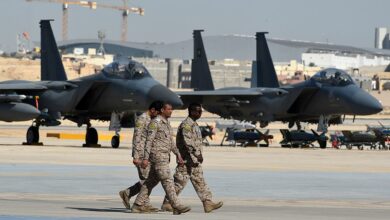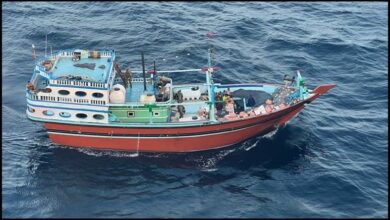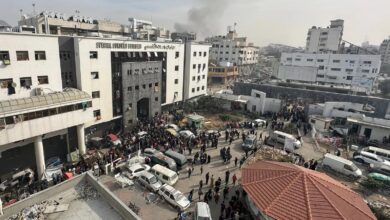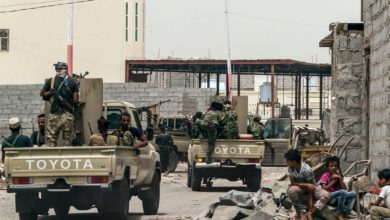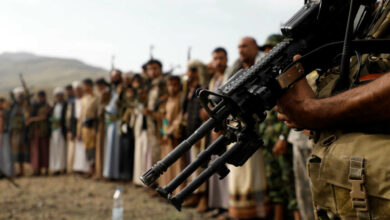Saudi-backed government forces in Yemen launched a series of attacks on rebel-held Hodeidah, military officials said Tuesday, September 18, raising fears of a humanitarian crisis as an 11-week pause in the battle for the port city ended.
The Houthi rebels accused the government and its Saudi-led allies of deliberately targeting food warehouses on Monday night, as the coalition said it had resumed a “military operation to liberate Hodeida and its port.”
Pro-government forces and medical sources in Hodeidah province told AFP that 40 Houthis have been killed around the port city since Monday night.
The fight for Hodeidah, which the Houthis seized in 2014, was put on hold for 11 weeks as the United Nations struggled to bring warring parties to peace talks in Geneva.
But the talks collapsed earlier this month after the northern Yemeni rebels refused to attend.
The Red Sea port of Hodeidah is a vital lifeline for aid shipments to Yemen, the most impoverished country in the Arab world.
The U.N. has warned that any major fighting could halt the distribution of food to eight million Yemenis dependent on the supplies to survive.
Claims over food warehouses
Brigadier General Ali al-Taniji, commander of coalition forces on Yemen’s west coast, confirmed the alliance had launched an operation in Hodeidah, in a statement to state media in the United Arab Emirates, Saudi Arabia’s main partner in the coalition.
Speaking on condition of anonymity, a senior coalition official told AFP the operation was being fought on multiple fronts.
Residents in and around the city, home to 600,000 people, reported hearing explosions throughout Monday night.
The Houthis accused the coalition of targeting food supply warehouses in the raids, claiming the international community was complicit in the attacks.
“International food supply warehouses were targeted in Hodeidah, a clear sign that there is a plan … to make warehouses and densely populated neighbourhoods legitimate targets of their terrorist operations,” said the head of the rebels’ Supreme Revolutionary Council, Mohammed Ali al-Houthi.
“International tolerance of terrorism has only encouraged (the coalition) to plan and deliberately commit crimes,” Houthi said.
A spokesperson for the Saudi-led coalition did not respond to a request for comment, while a World Food Programme spokeswoman declined to say whether the U.N. agency’s facilities had been hit.
Saudi Arabia and its allies accuse the Houthis of smuggling arms from Iran through Hodeidah, a charge the rebels and Tehran deny, and has imposed a partial blockade on the port.
U.N. envoy Martin Griffiths left the Yemeni capital Sana’a on Tuesday, ending a three-day trip.
Griffiths is pushing for new peace negotiations after the Geneva talks failed to get off the ground, with the Houthis saying they had not received guarantees for their safe return home afterwards.
Humanitarian flights
The U.N. on Monday announced it was working to open a humanitarian air bridge to transport Yemeni cancer patients abroad for treatment.
The Houthis said plans to fly patients out of Sana’a on Tuesday had been foiled by the coalition, accusing it of failing to cooperate.
World Health Organization spokesperson Fadela Chaib told AFP there was “no date set for the first flight” pending “final approval from all parties.”
While the rebels control the capital, Saudi Arabia and its allies control Yemen’s airspace and have put the Sana’a international airport under blockade.
In wheelchairs and carrying sick babies, Yemenis in the rebel-held capital lined up Tuesday outside the health ministry as rumors of the impending flight spread.
Ahmed Awad bin Mubarak, Yemen’s ambassador to the U.N., said his government was willing to “do whatever it takes to alleviate the suffering and pain of Yemenis,” in a letter to Secretary General Antonio Guterres.
But he asked that the U.N. and all its branches not sign agreements “except with the legitimate, internationally recognized government of Yemen.”
Saudi Arabia and its allies launched a major operation to retake Hodeidah in June before announcing the pause for peace talks.
The troops, backed by coalition airstrikes, have retaken a number of towns across Hodeidah province but have not yet breached the city.
The Saudi-led alliance intervened in the Yemen conflict in 2015 in a bid to bolster embattled Yemeni President Abd Rabbo Mansour Hadi, whose government is recognized by the U.N., in his war against the Houthis.
Nearly 10,000 people have since been killed, mostly civilians, and the country is facing a humanitarian crisis. The U.N. is investigating possible war crimes committed by all parties in Yemen’s conflict, with a recent report highlighting deadly airstrikes, sexual violence, and the recruitment of children as soldiers.
With reporting from AFP




